-
brands

Featured Brands
search for a brand name
TOP BRANDS IN ALPHABETICAL ORDERsee all brands
Aview Aurora World Products view Adajio Products view Astral Products view Altra Products view Asheville Tea Company Products view Acorn Products view Alpineaire Products view Albanese Products view Andar Products view Atlantic Coast Sports Products view Accoutrements Products view Amish Origins Products view Airtype Studio Products view Andre Prost Products view Atkinson Candy Products view All Terrain Products view Ai Root Candle Products view Adventure Medical Products view Anastasia Products view Accusharp Products view Ann Clark Products view American Classic Tea Products view Arcade Belt Co Products view Appalachian Trail Products view Andrews Mcmeel Products view A And M Leather Products view Antigravity Gear Products view Altiplano Products view Arkansas Products view Anchor Hocking Products view Andree By Unit Products view Appalachian Football Club Products view American Licorice Co Products view All Good Products view Aquatabs Productsmore ABview Blundstone Products view Birkenstock Products view Burt's Bees Products view Blue Ridge Apiaries Products view Benchmade Products view Buck N Bear Knives Products view Biscuit Head Products view Bay Pointe Products view Badger Products view Butternut Mtn.Farm Products view Barley Bones Products view Binghamton Knitting Products view Be Atlas Products view Buck Knives Products view Brooks Sports Products view Bogs Products view Buff Products view Boker Products view Bum Wraps Products view Bison Designs Products view Black Diamond Products view Baums Fried Pecans Products view Big Agnes Products view Brittle Brothers Products view Bag Balm Products view Bearvault Products view Bananagrams Products view Bubble Thing Products view Blackberry Patch Products view Born Products view Bearington Collection Products view Beantown Apparel Products view Black Dog Products view Boston International Products view Buena Onda Games Products view Blossom Products view Blue Ridge Knives Products view Bob Mandala Products view Be Creations And Des Products view Boston America Products view Bestech Knives Products view Biolite Products view Borealis Press Products view Big Sky Brands Products view Bacon And Company Products view Belmont Peanuts Products view Be Creations And Designs Products view Bubble Tree Products view Bourbon Foods Products view Basic Spirit Products view Books And Maps Products view Banana Boat Productsmore BCview Clay In Motion Products view Colonel Littleton Products view Carhartt Products view Carstens Products view Columbia Products view Colonel Conk Products view Cackalacky Products view Case Knives Products view Channel Craft Products view Calhoun Bend Mill Products view Charles Chips Products view Columbia River Knife Products view Chaco Products view Clic Products view Cotopaxi Products view C.C Collections Products view Charms Co. Products view Charles Viancin Products view Collins Lane Art Products view Cobble Hill Puzzles Products view Creative Crafthouse Products view Cooking Pleasures Products view Counter Art Products view Costa Del Mar Products view Castillo Knives Products view Coldpruf Products view Cottage Door Press Products view Carolina Kettle Chips Products view Chase Candy Products view Country Homes Products view Camelbak Products view Compendium Products view Crown Candy Products view Crazy Aarons Products view Charlie B Products view Crazy Creek Products view Civivi Products view Chala Handbags Products view Ceaco Products view Chapel Hill Toffee Products view Chums Ltd Products view Calloway Mills Products view Columbia Sportswear Products view Chattanooga Bakery Products view Carson Optical Products view Cablz Products view Cjrb Products view Colorforms Products view Carve Designs Products view Chaby International Products view Chef ` N Products view Cold Steel Products view Colosseum Products view Chia Pets Products view Capri Designs Products view Candy Dynamics Products view Crocodile Creek Products view Cold Storage Products view Chuckit Products view Cudas Products view Chad's Chai Productsmore CDview Darn Tough Socks Products view Davis Hill Products view Dansko Products view Duke Cannon Products view Duck Head Products view Deweys Bakery Products view Dorfman Pacific Products view Doug Osborne Products view Dot's Pretzels Products view Duer Products view Danner Products view Dovetail Workwear Products view Dorval Trading Co Products view D ` Vine Foods Products view Design Imports Products view Dr.Bronner's Products view Douglas Cuddle Toy Products view Duncan Toys Products view Deuter Products view Doschers Candy Products view Deejo Products view Darrell Lea Products view Demdaco Products view Delorme Mapping Productsmore DEview Eno Products view Exofficio Products view Elope Products view Ebba Products view Elf On The Shelf Products view Earth Sky + Water, Llc Products view Eagle Creek Products view Ecoxgear Products view Escape Products view Ecco Products view E Cloth Products view Ethyl Products view Esee Products view Eeboo Products view Eagles Wings Products view Elizabeth Etnier Productsmore EFview Fiesta Products view Farm To Feet Products view Fox River Products view Fire Buggz Products view Fits Sock Co. Products view Fairway Products view Fjall Raven Products view Ferrara Pan Candy Co Products view Frontier Soups Products view Free Fly Products view Fluff And Tuff Products view Fred And Friends Products view Fish Hippie Products view Fenix Products view Freestyle Products view Fashion Plates Products view Ford Gum Products view Fontanini Products view Flag And Anthem Products view Fox 40 Products view Folkmanis Products view Filson Products view Flexcut Productsmore FGview Gci Outdoor Products view Groove Life Products view Gsi Outdoors Products view Gerrit J Verburg Products view Green Toys Products view Gitzell Fairtrade Products view Gerber Products view Goetzes Products view Gregory Products view Grip6 Products view Green Street Products view Guyot Designs Products view Grand Trunk Products view Grayl Products view Go Girl Products view Gooseberry Patch Products view Giftcraft Products view Grabber Warmers Products view Garden Works Products view Gourmet International Products view Gear Aid Products view Gibbs Smith Products view Geocentral Products view Goal Zero Products view Ggb Candies Productsmore GHview Helms Candy Co Products view Hydro Flask Products view Hey Dude Products view Hoka One One Products view Hammonds Candies Products view Huk Products view Helle Products view Heritage Puzzle Products view Hershey Products view Heat Holders Products view Hasbro Products view Hultsbruk Products view Hatley Products view Helinox Products view Hydrapak Products view Hachette Products view Hip Signs Products view Hello Mello Lounge Wear Products view Howler Brothers Products view Hog Wild Products view High Cotton Products view House Of Marbles Products view Helly Hansen Products view Hungry And Howlin Products view Habitat Products view Heroclip Products view Hot Tips Products view Hf Publishing Productsmore HIview Iron Mountain Metal Craft Products view Indera Mills Products view Illume Products view Ingram Products view Iconic Candy Products view Impact Confections ProductsIJview Jameson Woodworks Products view Jetboil Products view Jelly Belly Candy Co Products view Joy Susan Products view Just Jump It Products view Jerry Matthews Products view Joey Henson Art Products view Joules Products view Jacobson Hat Co Products view Just Born Products view Ja Ru Products view Jay Mac Sports Productsmore JKview Kuhl Products view Keen Products view Kershaw Knives Products view Kraft Tyme Products view Karesuando Kniven Products view Kids Preferred Products view Klutz Products view Kelty Pack Products view Klean Kanteen Products view Kork Ease Products view Kavu Products view Kabar Products view Kay Dee Products view Keysmart Products view Katadyn Products view Kizer Cutlery Products view Kurt Adler Products view Kimmie Candy Products view Kut Products view Kuju Coffee Productsmore KLview Lodge Products view Lulu- B Products view Legacy Hats Products view Lowa Products view L.L.Bean Products view Lazy One Products view Leatherman Products view Lems Shoes Products view Life Is Good Products view La Mer Luxe Products view Lintex Linens Products view Loftus Products view Lantern Press Products view Laguiole Durand Products view Land Of Dough Products view Lil Sucker Products view Leki Products view L ` Artiste Products view Loksak Products view Little Brown Co Products view Lansky Products view Lifestraw Products view License- 2- Play Llc Products view Life Outside Sticker Co Productsmore LMview Mast General Store Products view Merrell Products view Mr Bird Products view Mason Cash Products view M.H.Bertucci Products view Mountain Khakis Products view Memaws Products view Msr Products view Mpowerd Products view Mount Inspiration Products view Mattel Products view Michaelian Home Products view Mountain House Products view Mystery Ranch Products view Molly And You Products view Marmot Products view Mast 1883 Products view Melissa And Doug Products view Mice On Main Products view Muddy Pond Products view Marsh Hen Mill Products view Mountainsmith Products view Matador Products view Marbles Products view Maple Landmark Products view Manhattan Toy Products view Mcgowan Products view Moonpie Products view Murphys Naturals Products view Metal Earth Products view Mountaineers Books Products view Mimis Mountain Mixes Products view Mountain Melodies Products view Marich Products view Macmillan Products view Madd Capp Games Products view Moonshine Products view My Pet Enterprises Products view Modgy Products view Marttiini Products view Master Pieces Puzzle Products view Mayberry Bbq Sauce Products view Myra Bag Products view Mata Traders Products view Mars Wrigley Products view Molly Bracken Products view Master Toys Products view Millymook Dozer Products view Mary Lake_thompson Products view Monroe Hardware Products view Mora Products view Morinaga Products view Mast Brand Products view Muddy Bites Products view Mederer Usa Products view Mondelez Products view Multipet Productsmore MNview Naylor Forge Products view No Kidding Products view North River Products view Nite Ize Products view Nebo Products view Nalgene Products view National Geographic Products view Nordic Company Inc Products view Natural Life Products view Now Designs Products view Nature Cast Metalworks Products view Nordic Ware Products view Noso Patches Products view Nexus Foods Inc Productsmore NOview Oboz Products view On Running Products view Old Mill Of Guilford Products view Olukai Products view Osprey Packs Products view Olde Colony Bakery Products view Old Mule Dipping Products view Old Friend Slippers Products view Oofos Products view Old Hickory Products view Oak Alley Farms Products view Old Ranch Products view Opinel Products view Old School Brand Products view Oliver Pluff And Company Products view Oneill Products view Outdoor Edge Products view Ouray Products view Olde Virden's Products view Over Under Products view Original Gourmet Products view Outdoor Research Products view Omega Screen Prints Productsmore OPview Patagonia Products view Palmetto Farms Products view Poppy Products view Primitive Woodsman Products view Pbj Products view Play Monster Products view Parris Manufacturing Products view Perry's Enterprises Products view Perfect Petzz Products view Pikolinos Products view P Graham Dunn Products view Puffin Products view Perky Pet Products view Primrose Products view Play Visions Products view Pressman Toy Products view Pearson Ranch Jerky Products view Primitives By Kathy Products view Prana Products view Platypus Products view Petzl Products view Peter Pauper Press Products view Pressbox Products view Pisgah Map Company Products view Pop Rocks Products view Professor Puzzle Products view Pocket Bellows Products view Perfetti Van Melle Products view Paricon Products view Prandi Products view Peking Handicraft Products view Pez Candy Co Products view Pacifica Products view Packtowl Products view Pendleton Products view Pale Blue Earth Productsmore PRview Royall Lyme Products view Raven's Nest Products view Rocket 9 Products view Ruffwear Products view Rumpl Products view Rosebud Products view Royal Robbins Products view Richardson Products view Rock Em Products view Radio Flyer Products view Red Carpet Studios Products view Rubik's Cube Products view Ruike Products view Ruby Road Products view Rough Rider Products view Rab Products view R.L.Scott Knives Products view Romper Room Products view Rm Palmer Products view Reflekt Products view Rigwa Productsmore RSview Savannah Bee Products view Salisbury Pewter Products view Schylling Products view Smartwool Products view Socksmith Products view Superfeet Products view Spin Master Products view Snoozies Products view Stanley Products view Sog Products view Stuart Nye Jewelry Products view Slinky Products view Sconza Products view Sperry Top- Sider Products view Swiss Army Products view Sunflower Food Co. Products view Scout Curated Wears Products view Spangler Candy Co Products view Stonewall Kitchen Products view Sienna Sky Products view Swiftwick Products view Spyderco Products view Sorel Products view Sea To Summit Products view Stroup Knives Products view Spirograph Products view Salomon Products view Sun Products view Streamlight Products view Skybar Candy Products view Schrade Products view Sherpa Products view Sawyer Products view Sawyer's Mill Products view Stetson Products view Sp Enterprises Products view Southern Recipe Products view Smarties Products view Santoki Products view Southern Fried Cotton Products view Slip- N- Snip Products view Simply Southern Products view Spunky Pup Products view S.S.Adams Co. Products view Steel Will Products view Sterling Products view Sweetworks Products view Sourcebooks Products view Spin- Balls Products view Soda Pup Products view Sweet Candy Co Products view Skye's The Limit Products view Standard Candy Co Products view Sabre Products view Sunday Afternoons Products view Stephan Baby Products view Squirrel Nut Butter Products view Sugarox Candy Studio Products view Skeeter Hawk Products view Sterling Rope Productsmore STview Tilley Products view Toysmith Products view Troutman Chair Products view Topo Athletic Products view True South Puzzle Co Products view Tk Obriens Products view The North Face Products view Two Old Goats Products view Trophy Music Products view Therm- A- Rest Products view The Printed Image Products view Tervis Products view Two Bros Bows Products view The Artist Jay Products view The Landmark Project Products view Tootsie Roll Products view Tedco Products view Think Fun Products view The Map Shop Products view Tiki Toss Products view Timex Products view Tin Box Products view Teva Products view Taylor Dry Goods Products view The Duck Company Products view Toor Knives Products view Ty Inc Products view Top Of The World Products view Taylor Old Bond St. Products view Toad And Co Products view The Original Toy Co Products view Tribal Sportswear Products view True Utility Products view Trish Brown Products view Taos Footwear Products view Taylor Environmental Products view The Stickery Products view Tortuga Imports Products view Tru Fru Products view Toob Productsmore TUview Unemployed Philosophers Guild Products view University Games Products view Uco Products view University Girls Products view Us Playing Cards ProductsUVview Vasque Footwear Products view Virginia Diner Products view Vintage 1946 Products view Victorinox Products view Vsa Accessories ProductsVWview Winkler Knives Products view Wind River Chimes Products view Wounded Warrior Products view World's Softest Products view Willow Tree Products view Wool Novelty Products view Worlds Smallest Products view Warmies Products view Warthog Products view Wind And Willow Products view Wild Republic Products view World Candies Products view Waterford Press Products view White River Knife And Tool Products view Woox Products view Wet- It Products view Waboba Products view Wildwood Productions Products view World Import Company, Inc Products view Wilfred Lee Books Productsmore W -
categories

Top Categories
CLOSE MENUMade In USA
Food Home & Hearth Personal Care Clothing & Accessories Candy Cast Iron Calendars, Cards, Journals, & Stickers Knives Outdoor Gear Pets Toys Sale & ClearanceWomen
Accessories Curvy Dresses Footwear Outerwear & Fleece Baselayers Leggings & Capris Pants Shirts & Tops Shorts Skirts & Skorts Sleepwear Sweaters & Midlayers Swimwear T-Shirts & Sweatshirts Travel Clothing Workwear Sale & ClearanceMen
Accessories Baselayers Footwear Outerwear & Fleece Pants Shirts Shorts Sleepwear Swimwear Sweaters & Midlayers T-Shirts & Sweatshirts Travel Clothing Workwear Sale & ClearanceGift Ideas
Wedding Gifts Her Him Kids Gift Boxes Gift Cards Jewelry Pets & Animal Lovers Secret Santa Stocking Stuffers Them Sale & ClearanceCandy
International Fruity & Fun Vegan Novelty Gum Mints Candy Bars Candy Gifts Caramels, Nougats, & Taffy Chocolate Gummies Hard Candy & Lollipops Hot Candy Jelly Beans Licorice Mast Candy Collection Nuts & Coconut Old Fashioned Favorites Sour Candy Holiday Candy Sale & ClearanceMast Collection
Candy Clothing & Accessories Food Mugs & Tumblers Ornaments Pottery Reusuable Totes Whatnots Sale & ClearanceHome & Hearth
Garden & Outdoor Living Home Decor Kitchen Cleaning Furniture Music Pottery Reusable Totes Sale & Clearance -
stores

Original - Valle Crucis close menu
visithours
mon9AM - 6PM
tue9AM - 6PM
wed9AM - 6PM
thu9AM - 6PM
fri9AM - 6PM
sat9AM - 6PM
sun11AM - 6PM
Annex - Valle Crucis close menu
visithours
mon10AM - 6PM
tue10AM - 6PM
wed10AM - 6PM
thu10AM - 6PM
fri10AM - 6PM
sat10AM - 6PM
sun11AM - 6PM
Asheville close menu
visithours
mon10AM - 8PM
tue10AM - 8PM
wed10AM - 8PM
thu10AM - 8PM
fri10AM - 9PM
sat10AM - 9PM
sun11AM - 6PM
Boone close menu
visithours
mon10AM - 6PM
tue10AM - 6PM
wed10AM - 6PM
thu10AM - 6PM
fri10AM - 8PM
sat10AM - 8PM
sun11AM - 6PM
Columbia close menu
visithours
mon10AM - 6PM
tue10AM - 6PM
wed10AM - 6PM
thu10AM - 6PM
fri10AM - 8PM
sat9AM - 8PM
sun11AM - 6PM
Greenville close menu
visithours
mon10AM - 8PM
tue10AM - 8PM
wed10AM - 8PM
thu10AM - 8PM
fri10AM - 9PM
sat10AM - 9PM
sun11AM - 6PM
Hendersonville close menu
visithours
mon10AM - 6PM
tue10AM - 6PM
wed10AM - 6PM
thu10AM - 6PM
fri10AM - 7PM
sat10AM - 7PM
sun11AM - 6PM
Knoxville close menu
visithours
mon10AM - 8PM
tue10AM - 8PM
wed10AM - 8PM
thu10AM - 8PM
fri10AM - 9PM
sat10AM - 9PM
sun11AM - 6PM
Roanoke close menu
visithours
mon10AM - 6PM
tue10AM - 6PM
wed10AM - 6PM
thu10AM - 6PM
fri10AM - 8PM
sat10AM - 8PM
sun11AM - 6PM
Waynesville close menu
visithours
mon10AM - 6PM
tue10AM - 6PM
wed10AM - 6PM
thu10AM - 6PM
fri10AM - 7PM
sat10AM - 7PM
sun11AM - 6PM
Winston-Salem close menu
visithours
mon10AM - 6PM
tue10AM - 6PM
wed10AM - 6PM
thu10AM - 6PM
fri10AM - 8PM
sat10AM - 8PM
sun11AM - 6PM
-
in-store pickup

Original - Valle Crucis close menu
selecthours
mon9AM - 6PM
tue9AM - 6PM
wed9AM - 6PM
thu9AM - 6PM
fri9AM - 6PM
sat9AM - 6PM
sun11AM - 6PM
Annex - Valle Crucis close menu
selecthours
mon10AM - 6PM
tue10AM - 6PM
wed10AM - 6PM
thu10AM - 6PM
fri10AM - 6PM
sat10AM - 6PM
sun11AM - 6PM
Asheville close menu
selecthours
mon10AM - 8PM
tue10AM - 8PM
wed10AM - 8PM
thu10AM - 8PM
fri10AM - 9PM
sat10AM - 9PM
sun11AM - 6PM
Boone close menu
selecthours
mon10AM - 6PM
tue10AM - 6PM
wed10AM - 6PM
thu10AM - 6PM
fri10AM - 8PM
sat10AM - 8PM
sun11AM - 6PM
Columbia close menu
selecthours
mon10AM - 6PM
tue10AM - 6PM
wed10AM - 6PM
thu10AM - 6PM
fri10AM - 8PM
sat9AM - 8PM
sun11AM - 6PM
Greenville close menu
selecthours
mon10AM - 8PM
tue10AM - 8PM
wed10AM - 8PM
thu10AM - 8PM
fri10AM - 9PM
sat10AM - 9PM
sun11AM - 6PM
Hendersonville close menu
selecthours
mon10AM - 6PM
tue10AM - 6PM
wed10AM - 6PM
thu10AM - 6PM
fri10AM - 7PM
sat10AM - 7PM
sun11AM - 6PM
Knoxville close menu
selecthours
mon10AM - 8PM
tue10AM - 8PM
wed10AM - 8PM
thu10AM - 8PM
fri10AM - 9PM
sat10AM - 9PM
sun11AM - 6PM
Roanoke close menu
selecthours
mon10AM - 6PM
tue10AM - 6PM
wed10AM - 6PM
thu10AM - 6PM
fri10AM - 8PM
sat10AM - 8PM
sun11AM - 6PM
Waynesville close menu
selecthours
mon10AM - 6PM
tue10AM - 6PM
wed10AM - 6PM
thu10AM - 6PM
fri10AM - 7PM
sat10AM - 7PM
sun11AM - 6PM
Winston-Salem close menu
selecthours
mon10AM - 6PM
tue10AM - 6PM
wed10AM - 6PM
thu10AM - 6PM
fri10AM - 8PM
sat10AM - 8PM
sun11AM - 6PM
-
blog

latest blog posts see all blog posts CLOSE MENU
-
February 3, 2026 6 minute READ
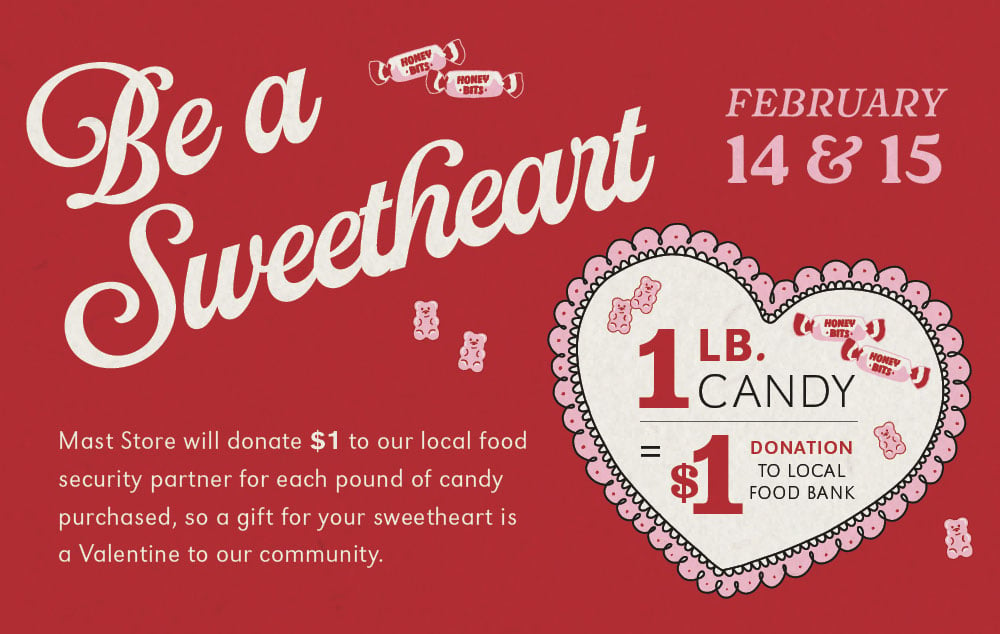
A Long-Running Sweet Feast
What would Valentine’s Day be if we didn’t swap sweets with our sweethearts? ...read more
 Inspiration | Local Flavor | Mast Family Favorites
Inspiration | Local Flavor | Mast Family Favorites
 All
All
-
January 29, 2026 7 minute READ
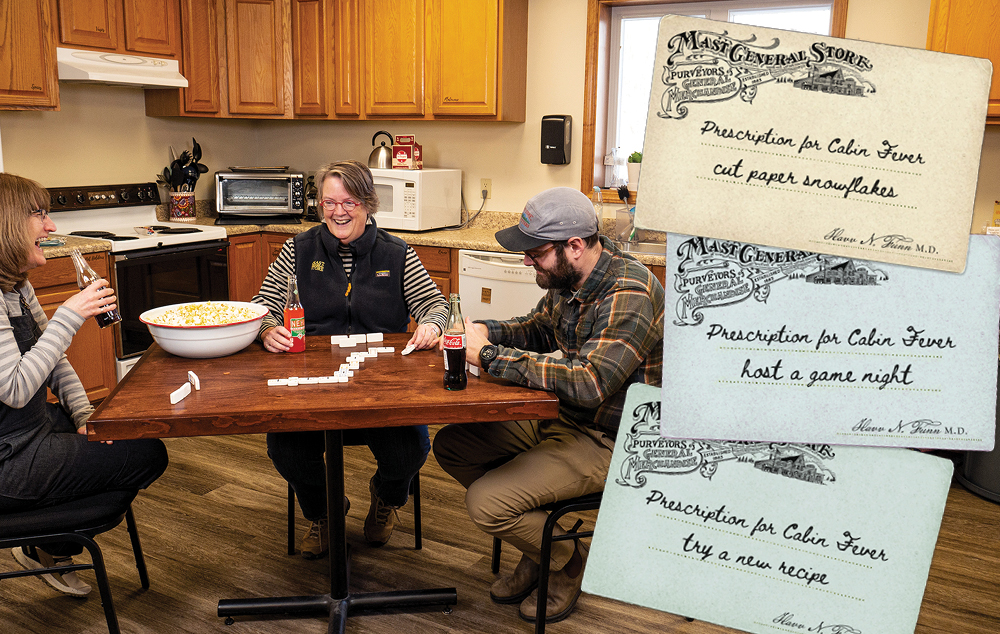
Prescriptions For Cabin Fever
Cabin fever can be suffered even by those who don’t reside in a cabin. Its symptoms include irritability, boredom, lack of energy, anxiety, and impatience. Sufferers can be kids who’ve had too many snow days, individuals who are working from home, or anyone who stares out the window wondering when spring will arrive. ...read more
 Adventure | At Home | Inspiration
Adventure | At Home | Inspiration
 All
All
-
January 14, 2026 11 minute READ
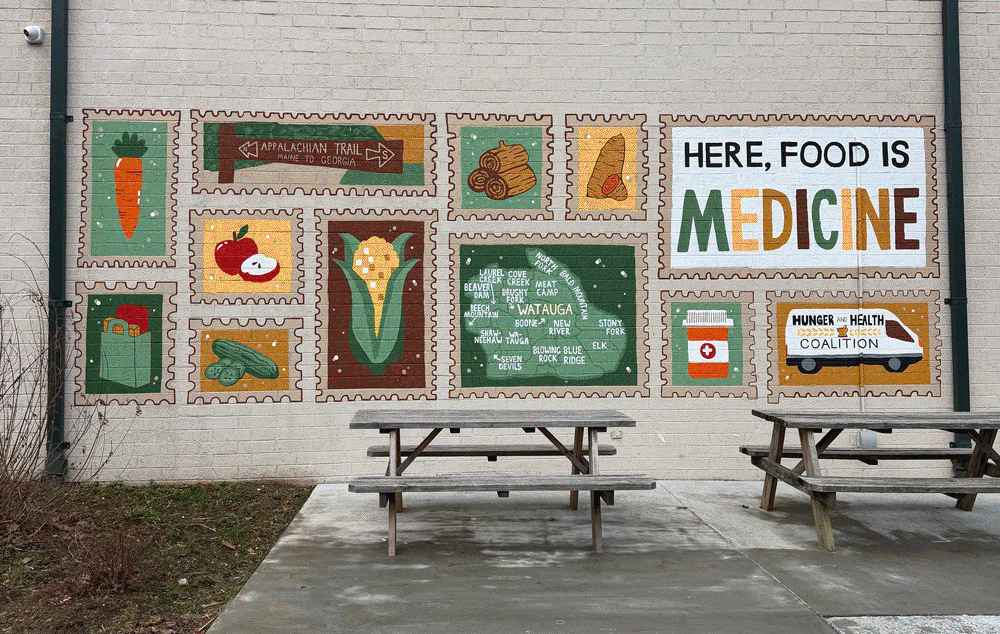
Take on Something Bigger Than Yourself
How does one eat an elephant? One bite at a time. How does one make change? It starts with an idea that can be put into action. By sharing the idea with other people, the action gains momentum and creates a movement. The movement, with a firm hand and clear direction, makes strides to the goal of the original idea of change. ...read more
 Inspiration | Local Flavor | Mast Family Favorites
Inspiration | Local Flavor | Mast Family Favorites
 All
All
Favorite blog posts CLOSE MENU
-
March 3, 2025 14 minute READ
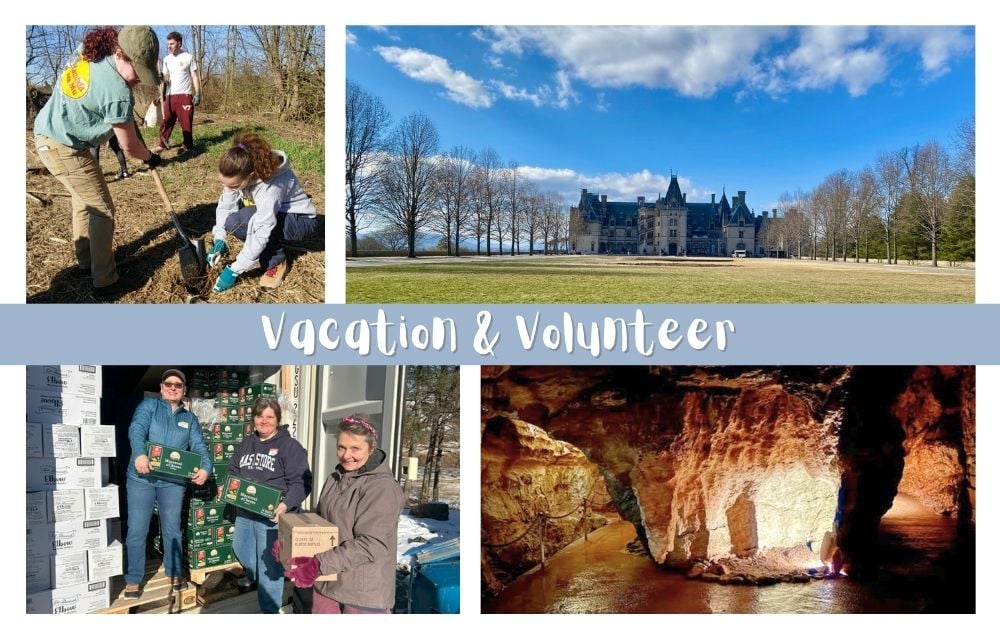
The Mountains Are Open - Vacation & Volunteer
In the days after September 27, 2024, highway information signs were emblazoned with a message... Do Not Travel in Western North Carolina. That sounds ominous, but its message was not overstated. Because of the tireless work by state and federal employees, local folks, and thousands and thousands of volunteers, the mountains are OPEN – including two lanes of Interstate 40 – and we invite you to vacation... And volunteer! ...read more
 Inspiration | Local Flavor | Travel
Inspiration | Local Flavor | Travel
 All
All
-
November 30, 2023 10 minute READ
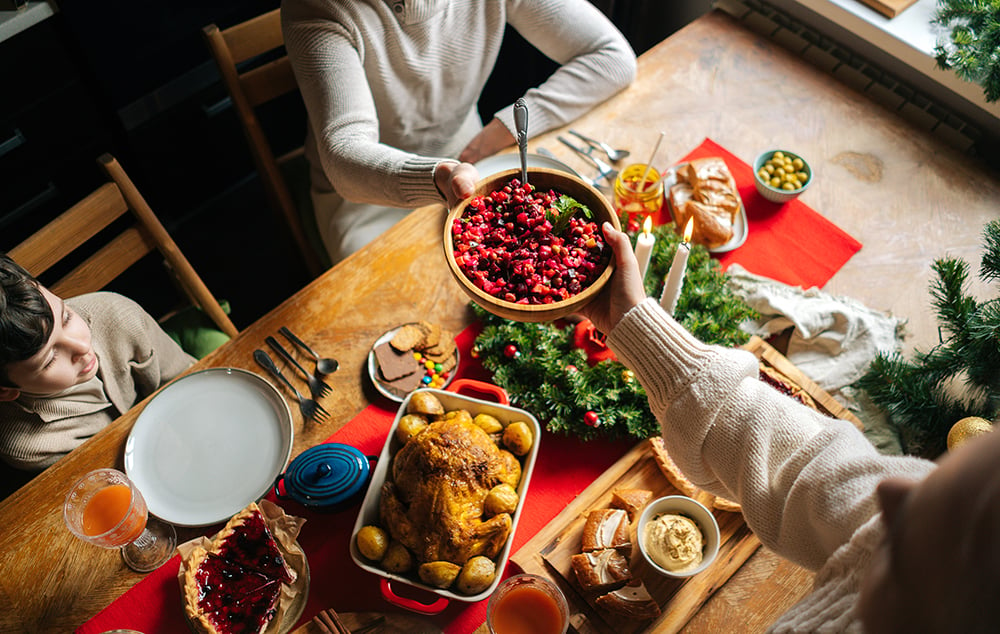
It Just Would Not Be the Holidays Without
... Our favorite foods! Food is universal because everybody’s got ta eat! And the last two months of the year are filled with more than their fair share of family meals, work gatherings, special outings to favorite restaurants, tins filled with homemade cookies and fudge, and the anticipation of food traditions handed down from generation to generation ...read more
 At Home | Recipes
At Home | Recipes
 All
All
-
May 26, 2023 7 minute READ
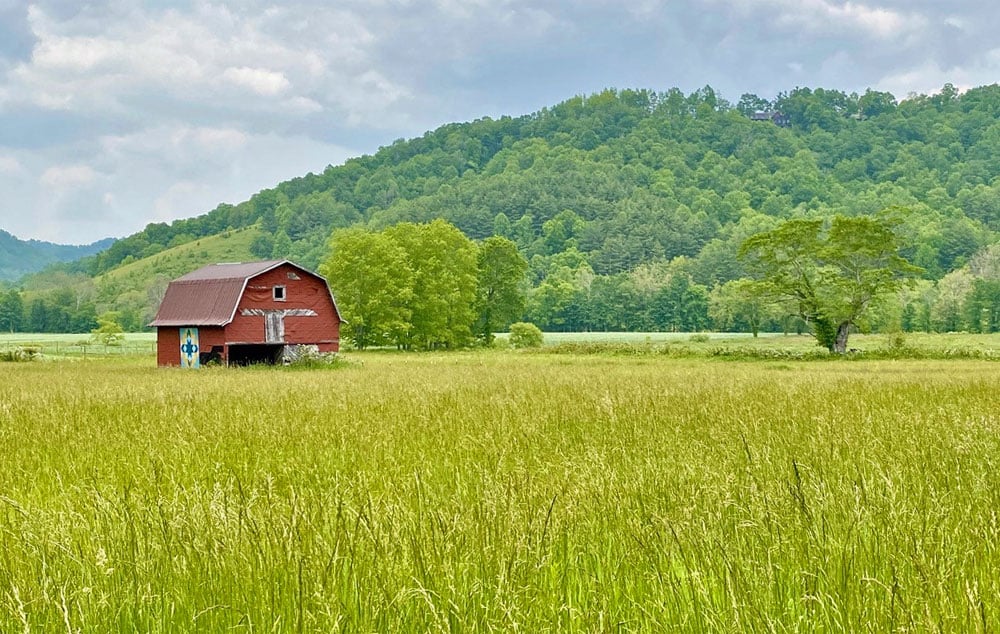
John and Faye Cooper: Why We Support Land Trusts
Even before we bought the Mast General Store, we were taken by the beauty of Valle Crucis. We’ve heard people describe the drive out Broadstone Road as traveling through a time portal. In the 1970s, fields in the river bottoms would be filled with tobacco, cabbage, or high with hay to feed cattle that were grazing in the summer pasture. ...read more
 Local Flavor | Mast Family Favorites
Local Flavor | Mast Family Favorites
 All
All
CLOSE MENU
all Original - Valle Crucis Annex - Valle Crucis Asheville Boone Columbia Greenville Hendersonville Knoxville Roanoke Waynesville Winston-Salem location
location -
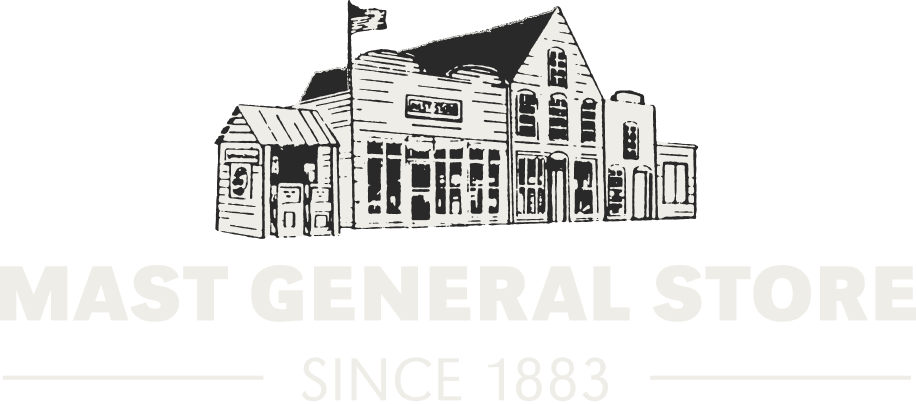

 Sign In
Sign In
 Go to My Account
Go to My Account Password Reset
Password Reset Email Preferences
Email Preferences Order History
Order History Address Book
Address Book Mailing List
Mailing List Wish List
Wish List Sign Out
Sign Out

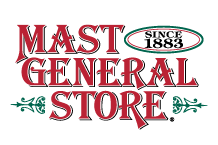




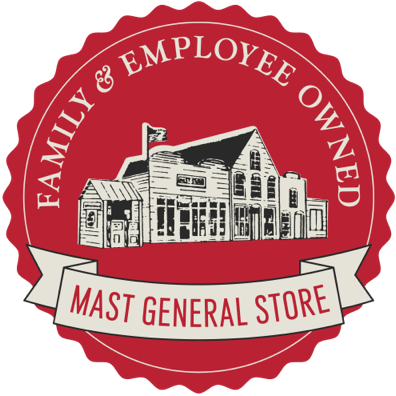

 828-963-6511
828-963-6511 directions
directions Parking
Parking








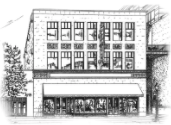












 history
history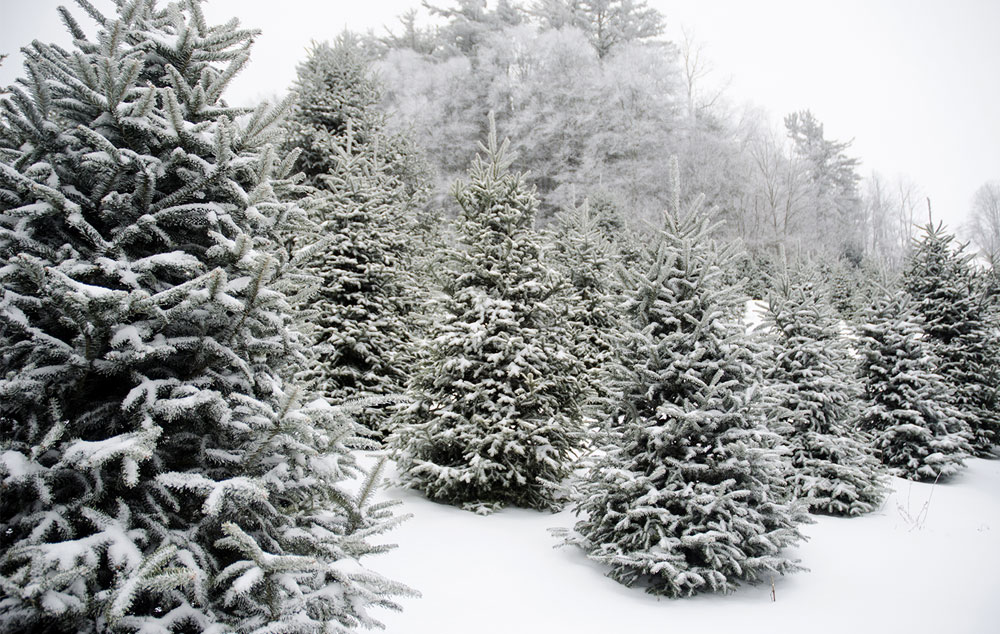
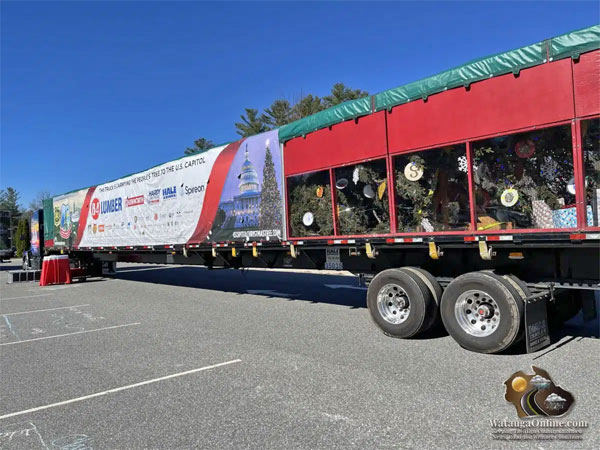 Ruby, a 78-foot evergreen tree, was bound for the United States Capitol as its annual Christmas Tree. While Ruby wasn’t yet decorated for her audiences as she was en route to the Capitol, all who saw her knew that she was destined to shine and represent her Carolina home with pride.
Ruby, a 78-foot evergreen tree, was bound for the United States Capitol as its annual Christmas Tree. While Ruby wasn’t yet decorated for her audiences as she was en route to the Capitol, all who saw her knew that she was destined to shine and represent her Carolina home with pride. olina tree farmers grow other common household Christmas tree varieties – although not typically colossal red spruces like Ruby – including Scotch pines, Canaan firs, eastern red cedars, and Leyland cypresses among several others, the Fraser fir represents 99.4% of all species grown in the state.
olina tree farmers grow other common household Christmas tree varieties – although not typically colossal red spruces like Ruby – including Scotch pines, Canaan firs, eastern red cedars, and Leyland cypresses among several others, the Fraser fir represents 99.4% of all species grown in the state. 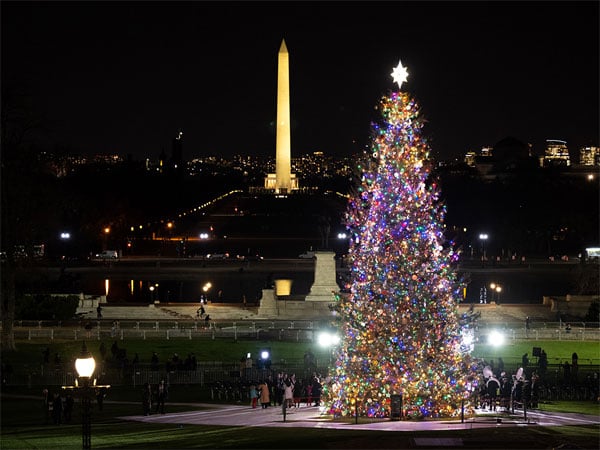 With North Carolina accounting for nearly 20% of the country’s Christmas tree production, it’s certainly not the only state in the Mast Store’s area that produces this festive crop. According to the Virginia Department of Agriculture and Consumer Services, the Commonwealth harvests 4.3 million trees each year from 460 farms. This makes it the seventh-largest Christmas Tree producer in terms of inventory.
With North Carolina accounting for nearly 20% of the country’s Christmas tree production, it’s certainly not the only state in the Mast Store’s area that produces this festive crop. According to the Virginia Department of Agriculture and Consumer Services, the Commonwealth harvests 4.3 million trees each year from 460 farms. This makes it the seventh-largest Christmas Tree producer in terms of inventory.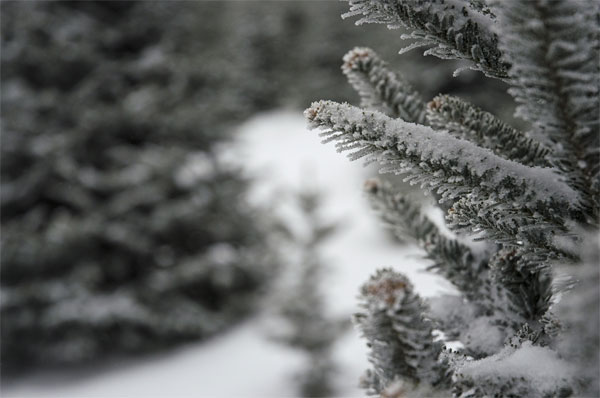 Also consider this year that, in addition to the warmth they bring to our holiday season, Christmas trees provide livelihoods for many local farmers. Their sales put the family Christmas meal on these folks’ tables, and bolster our county, regional, and state economies. If you’ve never savored the aroma of a real Christmas tree in your home during the Holidays, we’d encourage you to give it a shot this year! It’s easy as long as you water it properly, set it away from any open flames, and make sure low-hanging lights and decorations are out of the reach of any pets or small children. Or, if you’re already a live tree purist, we encourage you to “shop locally” for your tree and visit a nearby
Also consider this year that, in addition to the warmth they bring to our holiday season, Christmas trees provide livelihoods for many local farmers. Their sales put the family Christmas meal on these folks’ tables, and bolster our county, regional, and state economies. If you’ve never savored the aroma of a real Christmas tree in your home during the Holidays, we’d encourage you to give it a shot this year! It’s easy as long as you water it properly, set it away from any open flames, and make sure low-hanging lights and decorations are out of the reach of any pets or small children. Or, if you’re already a live tree purist, we encourage you to “shop locally” for your tree and visit a nearby